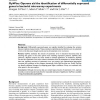Free Online Productivity Tools
i2Speak
i2Symbol
i2OCR
iTex2Img
iWeb2Print
iWeb2Shot
i2Type
iPdf2Split
iPdf2Merge
i2Bopomofo
i2Arabic
i2Style
i2Image
i2PDF
iLatex2Rtf
Sci2ools
124
click to vote
BMCBI
2006
2006
OpWise: Operons aid the identification of differentially expressed genes in bacterial microarray experiments
Background: Differentially expressed genes are typically identified by analyzing the variation between replicate measurements. These procedures implicitly assume that there are no systematic errors in the data even though several sources of systematic error are known. Results: OpWise estimates the amount of systematic error in bacterial microarray data by assuming that genes in the same operon have matching expression patterns. OpWise then performs a Bayesian analysis of a linear model to estimate significance. In simulations, OpWise corrects for systematic error and is robust to deviations from its assumptions. In several bacterial data sets, significant amounts of systematic error are present, and replicate-based approaches overstate the confidence of the changers dramatically, while OpWise does not. Finally, OpWise can identify additional changers by assigning genes higher confidence if they are consistent with other genes in the same operon. Conclusion: Although microarray data ca...
| Added | 10 Dec 2010 |
| Updated | 10 Dec 2010 |
| Type | Journal |
| Year | 2006 |
| Where | BMCBI |
| Authors | Morgan N. Price, Adam P. Arkin, Eric J. Alm |
Comments (0)

